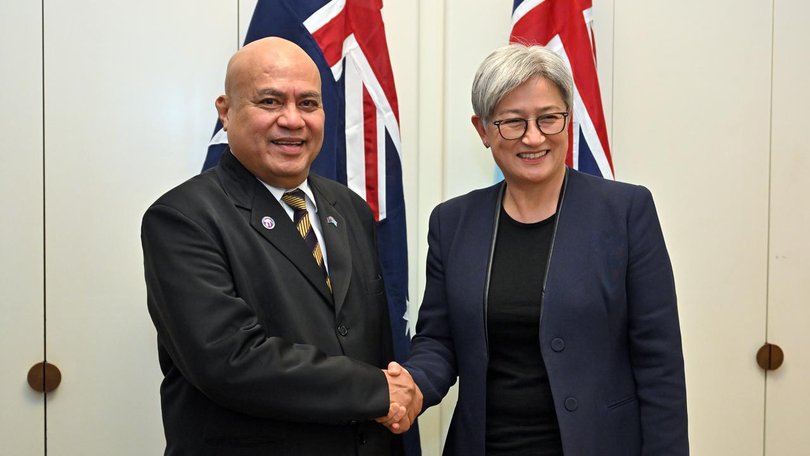Australia, Tuvalu look to develop landmark climate pact
Developing climate and strategic ties with Australia has been discussed by Tuvalu's leader as the Pacific island nation opens a high commission in Canberra.

Australia and Tuvalu will work on progressing a landmark treaty as the two nations seek closer ties in tackling the impacts of climate change in the region.
Some 90 per cent of Tuvalu’s population, or 8750 people, entered a ballot for one of the 280 visa spots allowing them to live, work and study in Australia under the treaty.
Tuvalu Prime Minister Feleti Teo thanked Australia for its help on climate change during a meeting with Foreign Minister Penny Wong while in Canberra to open a new high commission.
Sign up to The Nightly's newsletters.
Get the first look at the digital newspaper, curated daily stories and breaking headlines delivered to your inbox.
By continuing you agree to our Terms and Privacy Policy.“Now that the ballot has been done, we need to work through the outcomes of the ballot and get some proper assessment of ... how the Tuvalu public in general perceives the outcome,” Mr Teo said in his opening remarks on Tuesday.
“As we went through various public consultations on the treaty, there were different viewpoints on how that should be managed.
“This is the start and we look forward to more collaborations.”
The Falepili Union between the two nations came into effect in August 2024.
In a world first, Australia committed to continued recognition of Tuvalu’s continuing statehood as it faces the existential threat of rising sea levels and agreed to come to the atoll nation’s aid if called upon for assistance responding to natural disasters, pandemic or military aggression.
In return, Tuvalu agreed to give Australia a say in agreements it signs with third countries relating to defence and security, which followed concerns over Beijing striking security deals with Pacific nations.
The provision stirred controversy in Tuvalu over sovereignty concerns as there was a view that Australia had an effective veto over bilateral security agreements.
Mr Teo reviewed the treaty’s provisions when he came to power in February 2024, when it had been negotiated by the previous government but yet to enter into force.
Australia reaffirmed Tuvalu’s sovereignty in a joint statement in May of the same year, following a visit by Senator Wong.
“It’s an agreement that respects your sovereignty, your culture, your identity while preparing for a more challenging future,” Senator Wong reiterated on Tuesday.
“We are neighbours, we are family, we share an ocean and we share a future.”
Mr Teo also met with Prime Minister Anthony Albanese while in Canberra.
Australia agreed to provide $110 million in development assistance and budget support to Tuvalu as part of the treaty, including $50 million for its first undersea communications cable.
Mr Teo singled out the cable as a major project Australia had helped with, as the better connectivity that started in December 2024, boosting access to telehealth services among other benefits.
“I think it was the biggest Christmas gift that we ever received,” he told Senator Wong.
